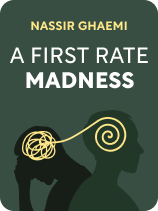

This article is an excerpt from the Shortform book guide to "A First Rate Madness" by Nassir Ghaemi. Shortform has the world's best summaries and analyses of books you should be reading.
Like this article? Sign up for a free trial here.
Are there any benefits of depression? How does depression improve your perspective on difficult situations?
Depression is a mental illness that most try to avoid. However, leaders may find some benefits of depression that help them handle critical moments with the right insights.
Continue reading to learn how depression can help you, according to A First-Rate Madness by Nassir Ghaemi.
1) Depression Gives You a Realistic Perspective
In Ghaemi’s eyes, one benefit of depression is that leaders who either suffer from depression or have dysthymic personalities are better at realistically assessing critical situations, while mentally healthy leaders are too optimistic. To illustrate this, Ghaemi points to experiments showing that mentally healthy people tend to overestimate how much control they have over situations—for example, they overestimate their ability to predict the results of coin tosses or to control random events.
This phenomenon is called an “illusion of control.” The experiments Ghaemi discusses showed that people with depression have a more realistic perception of control over their environment, more accurately judging their ability to predict chance events or to influence those events.
(Shortform note: The illusion of control is what’s known as a positive illusion, which is an unrealistically pleasant belief we hold to maintain our psychological well-being and happiness. When we have these to a mild degree, they make us happier. For example, when we believe we’re more capable than others or that we deserve good things, we can better overcome the stresses in our lives. It’s when positive illusions lead us to adopt unrealistic beliefs—like that we can predict coin tosses or influence randomness—that they can lead us to make poor decisions.)
Ghaemi contends that, for leaders, this illusion of control can develop into the hubris syndrome, a term coined by David Owen, who argued that people in power become increasingly overconfident in their beliefs and abilities and refuse to adapt to changing circumstances. This stubborn optimism can cause leaders to make wrong decisions when managing sensitive situations
(Shortform note: David Owen defines hubris as overconfidence and pridefulness, arguing that hubris turns into a syndrome the longer someone holds power with little restraint. Several characteristics of this syndrome include being overly concerned with appearance, having the tendency to use the third person or plural “we” pronoun, and prioritizing a vision over potential costs or outcomes. After studying leaders of the past century, Owen determined that Winston Churchill and Franklin D. Roosevelt didn’t have hubris syndrome while Neville Chamberlain, Tony Blair, and George W. Bush did. These conclusions align with Ghaemi’s in that the leaders Ghaemi claims had mental illness did not display symptoms of hubris, while the others did.)
2) Depression Enhances Your Empathetic Understanding
In addition to enhancing realistic judgment, Ghaemi contends that another benefit of depression is that it also broadens a leader’s perspective and understanding by making them more empathetic, a trait that allows them to effectively navigate critical situations.
Empathy is more than just relating to someone else—when you empathize, you truly experience what someone else is experiencing. Ghaemi explains that your brain has mirror neurons that activate when you see someone doing or feeling something. These allow you to feel as though you actually think someone else’s thoughts or feel their emotions, movements, and sensations.
(Shortform note: In Emotional Intelligence, Daniel Goleman writes that the amount of empathy you have depends on how you were nurtured during your childhood. Around age two and a half, toddlers begin to recognize pain experienced by others and not just their own. Parents who explain their feelings help their children become more aware of emotions in themselves and others, thereby increasing empathy. At the same time, while having a lot of mirror neurons helps you empathize with others, they can also make you unhappy if you’re overly sensitive to other people’s negative emotions.)
Ghaemi points to studies that link depression to higher empathy, particularly on an emotional level. He explains that depressive episodes leave you with a lingering sensitivity to other people’s experiences and allow you to better relate to them. This empathy ultimately allows you to understand multiple viewpoints, which is a key leadership trait.
(Shortform note: While depression can lead to increased feelings of empathy, it can also lead people to misunderstand some of those empathetic feelings. This can cause people with depression to experience empathetic distress, or feelings of guilt for other people’s negative feelings. They explain that people with depression are often sensitive to other people’s emotions yet have an inaccurate understanding of what causes their emotions. For example, a person with depression might notice irritability in their colleague’s tone while collaborating on a difficult project and think they’re annoyed with them instead of the project. This misunderstanding of causality can lead people with depression to experience more personal guilt and distress.)

———End of Preview———
Like what you just read? Read the rest of the world's best book summary and analysis of Nassir Ghaemi's "A First Rate Madness" at Shortform.
Here's what you'll find in our full A First Rate Madness summary:
- How mental illness can make someone a better leader
- How leaders like Churchill and Roosevelt benefited from mental illness
- The pitfalls of being a mentally well leader during a time of crisis






